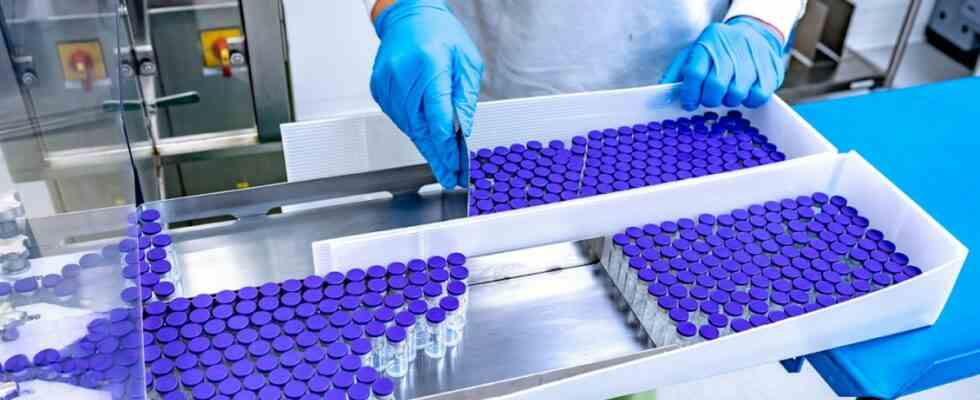The call from Biontech reached Hans-Georg Feldmeier’s colleagues in Brehna in May 2020. The pharmaceutical world is sometimes quite small. The Mainz-based company Biontech has a subsidiary in Halle, the company Dermapharm from Grünwald near Munich, whose boss is Feldmeier, a few kilometers away in Brehna. In the industry, everyone knows what the other can and is doing. Also that Dermapharm is familiar with lipids and has a sterile production facility in Brehna. Exactly what Biontech was looking for in spring 2020 for its potential vaccine against the coronavirus. “We produced the first batches at the end of September 2020,” says Feldmeier: “We also took the risk and made advance payments.” The vaccine, which Biontech developed with its partner Pfizer, was approved in December 2020, first in the USA and a little later in the European Union.
Dermapharm is one of the swarm of companies surrounding Biontech and without which vaccine production would probably not have been ramped up so quickly. In Brehna and at the Reinbek site near Hamburg, Dermapharm can produce up to 580 million doses of vaccine per year. “But we didn’t always fully utilize the capacities,” says Feldmeier. Formulation, filling and packaging take place at Dermapharm. Part of the formulation is that the active substance, the mRNA, is encased in lipids. Feldmeier says that the vaccine adapted to omicron variants can also be produced in Brehna and Reinbek. Biontech and Pfizer have already submitted approval of the vaccine, which has been adapted to the BA.4 and BA.5 variants, to the authorities in the USA and the EU. According to the two companies, the vaccine will be available shortly after approval.
Feldmeier, who is also chairman of the Federal Association of the Pharmaceutical Industry (BPI), likes to talk about such successes because they show what the German pharmaceutical industry is capable of. But he doesn’t like it when Dermapharm is reduced to working for Biontech. Dermapharm benefited from vaccine production, that’s true. The share price of the company, which is listed in the S-Dax small-cap segment, rose sharply to a good 90 euros at the beginning of November 2021. The paper now costs around 48 euros. In 2021, sales increased by almost 19 percent to almost 943 million euros and the operating result by almost 120 percent to almost 300 million euros. Feldmeier does not want to reveal how much the Biontech vaccine contributed. It falls under the item “branded pharmaceuticals and other health products”, which contribute a good two-thirds to the group’s sales. Almost eight percent are plant extracts and around a quarter are so-called parallel imports. Through its subsidiary Axicorp, Dermapharm imports original medicines from other EU countries that are cheaper there and markets them in Germany – repackaged and with a German package insert.
There are a few hundred products in Dermapharm’s portfolio, the better-known include vitamin D preparations such as Dekristol, birth control pills such as Madinette, dietary supplements such as Silicea and the sunscreen product Tyrolean nut oil, which Feldmeier says is no longer particularly advertised but is still popular in Tyrol sold well. Or a pen that uses heat to relieve itching after insect bites. In order to expand its range, the group has repeatedly taken over individual products or entire companies, such as recently the French company Arkopharma, which specializes in herbal medicines – for 450 million euros. Feldmeier makes no secret of the fact that Dermapharm was also able to afford such acquisitions because of the additional earnings contributions from vaccine production.
The group avoids overly competitive markets
Most of the drugs that Dermapharm offers require a prescription. It is either the original product that is no longer patent-protected, or a copycat product developed by Dermapharm, a generic product. Feldmeier avoids overly competitive drug markets: “We are looking for niches.” For him, these are, for example, medicines for which there are no discount agreements with the statutory health insurance companies or hardly any competitors, or products for self-payers such as birth control pills, which are prescribed by the doctor, but women over the age of 22 have to pay for the contraceptives themselves.
In addition to the main location in Brehna, Dermapharm operates other locations within Europe, primarily in Germany and the USA. The group gets about half of the active ingredients from Asia. “There is still pharmaceutical production in Europe and also in Germany. But it shouldn’t be destroyed further,” says Feldmeier: “Another emigration must be prevented.”
At the moment, however, it looks like the pressure on drug manufacturers will increase. At least that’s how Feldmeier assesses the draft adopted by the Federal Cabinet at the end of July GKV Financial Stabilization Act. Feldmeier is particularly annoyed that the price moratorium is to be extended by four years beyond 2022. Since 2010, the prices for drugs prescribed at the expense of the statutory health insurance funds have been frozen at the level of autumn 2009, and since summer 2018 the manufacturers have received inflation compensation. The moratorium does not apply to medicines for which a fixed price applies and new medicines whose pricing is based on the Law on the Reorganization of the Medicines Market (Amnog).
“Nobody talked to us,” says Feldmeier. And by “us” in this case he means his association, the BPI. He had repeatedly asked for an appointment with Federal Minister of Health Karl Lauterbach. Feldmeier does not see savings potential in medicines, but elsewhere, for example in greater digitization of the health system or better prophylaxis, because this prevents follow-up costs. Feldmeier now has at least one appointment with Lauterbach – on September 5th. But he does not have high hopes that there will be any major changes to the government draft.

